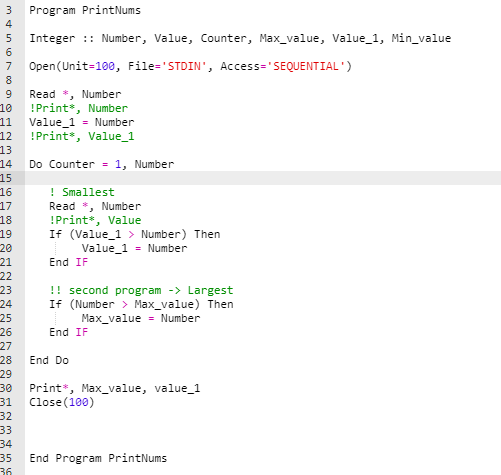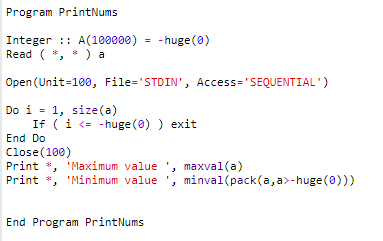Tuesday March 13th
Fortran and stuff
Here is a Fortran Programme I wrote today

-
It basically takes a bunch of STDIN inputs until it gets to the end of the file, and then gives you the maximum and minimum value.
-
Getting the largest was easy (just replace it if the read-in value is larger than your current value, which is the largest). For the smallest, I had to remember to initialize the value, or your smallest would be zero by the end of the do loop (assuming that there are no negative values).
This was the output

-
The smallest number in my list is 3 and the largest is 98. This is in Fortran 95.
-
Things are a little repetitive but some of it makes sense. Then again, I’m just learning for a class. I have to write a COBOL programme for next week, also (fun fun! Speaking of “wordy” lol).
Updated
- So I got feedback from my mentor, and he suggested a couple things
- There are a few ways to read in the array:
- use list-directed input, where it will see exit reading upon seeing ‘/’. Use this with a sentinel value
- use allocatable and deferred bounds
- use an internal sub-routine make the arrays automatic instead of allocatable. Here is a SO answer that talks about memory differences between automatic and allocatable.
- He also showed me a short-cut to finding the min and max value by creating an anonymous temporary variable with a size equal to the number of values greater than the sentinel, and then finding the minimum value. This array does not optimize performance.
Performance
- I found this Intel thread on allocatable arrays, which was also really interesting. Granted, this array isn’t huge, but for larger arrays, I may have had to use allocatable to avoid a seg fault crash/ running out of memory.
So this is what the updated result looks like

- A lot less repetitive
And the updated output

- Look at the difference! I still have to figure out what he speaks about
with respect to unit number and
use iso_fortran_env, only.I’m not quite familiar with that and need to do some reading up on that.
I also submitted a talk
- I don’t know if I’ll get in, but it’s on Denotational Semantics, which I’m learning about, and Haskell. It’s a short talk, but I thought I’d try to talk about something I’m passionate about. It’s about preserving the meaning in a programme and involves some lambda calculus without explicitly talking about it. The crowd includes a fair amount of beginners, so I’m trying to sneak it in, in a fun way.
And applications
- I’m rushing to complete this one application, and trying to do due diligence on another. No guarantees, but it’s worth a shot and I’ll give both my all.
And other stuff…
- I’m helping with the Board of this committee affiliated with a conference I attended last year, and helping a computer scientist with some research that isn’t necessarily academic, but is good to just work on in general. I like doing that stuff, particularly research in general, so I figure why not. Plus, I could possibly use my Data-wrangling skills to visualize and parse data and analyze content.
Random
-
I love this post! I just discovered this guy; Jay McCarthy. In it, he discusses writing the Collatz Conjecture in LaTeX!
-
Someone recruited me for a Clojure job today. lol. I don’t…write…Clojure. I seem to get the weird ones…Clojure, Scala, Mathematica, Haskell, Julia, PureScript…those are all things I’ve either been recruited for/ interviewed for, which is funny. Oh, and I got recruited for a robotics gig randomly as well the other day (C++/ Python). I have no idea why because I’m literally still in school.
I’m really excited
- I’m excited about LambdaConf. I hope that it all works out and I can go, but who knows. Taking it one day at a time.
